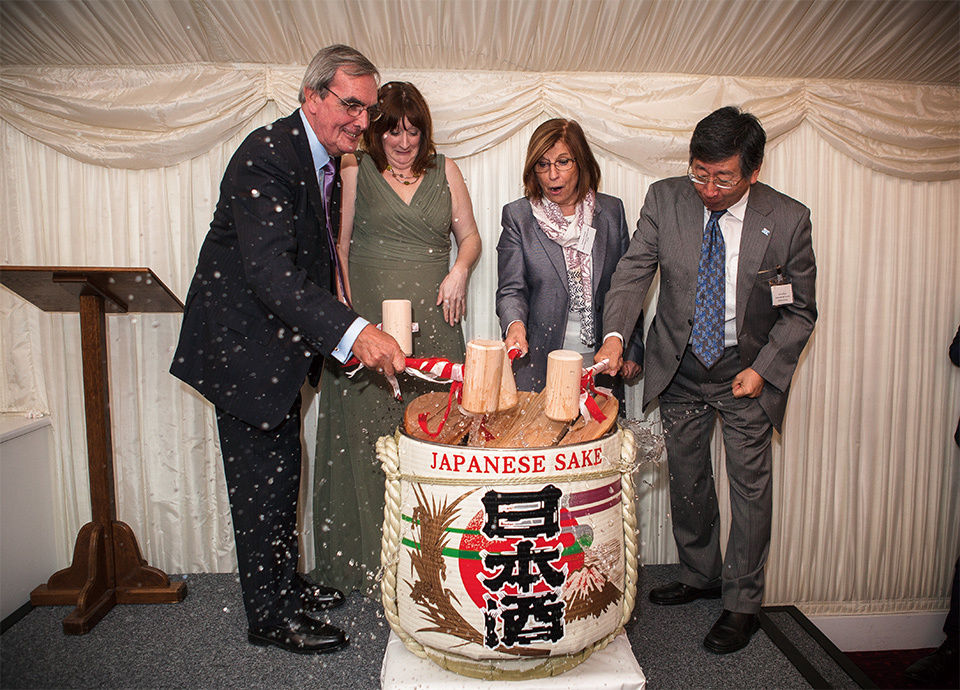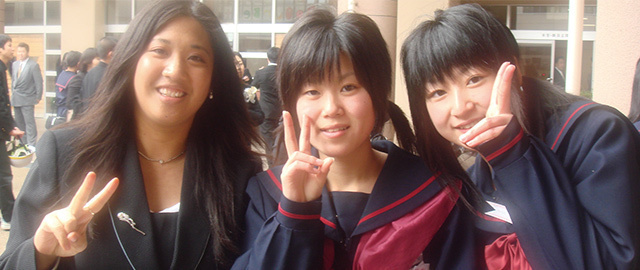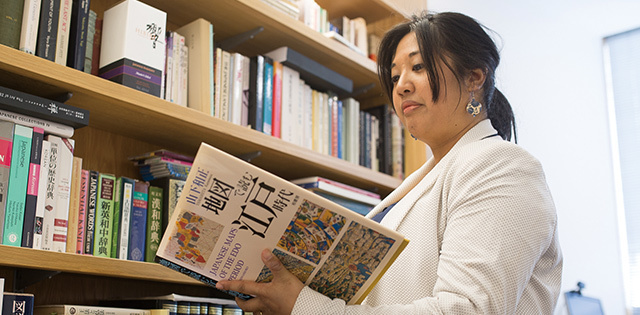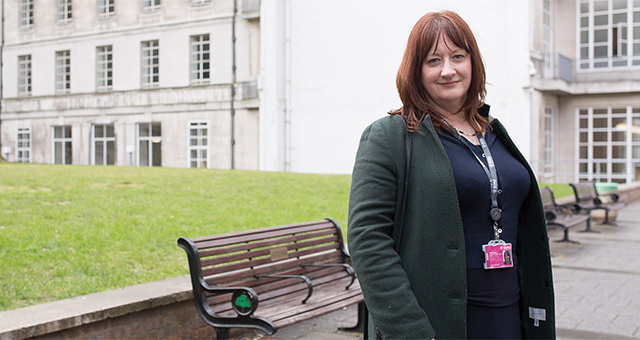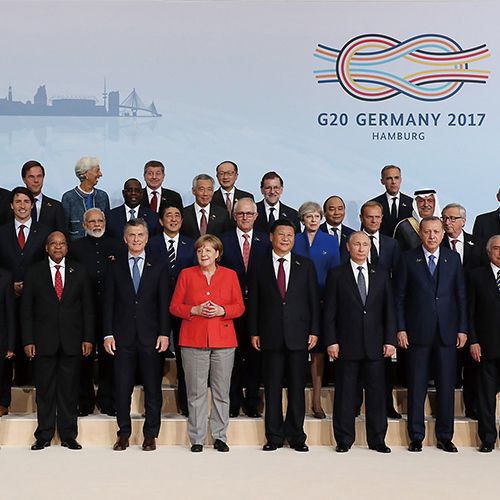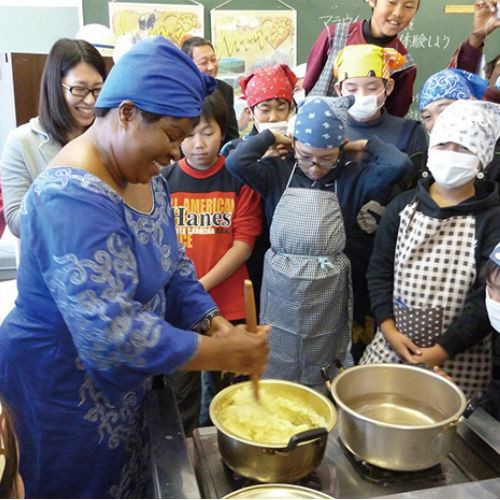At the Houses of Parliament, March 16, 2017, celebrating the 30th anniversary of the JET Programme. From left to right: Roger Godsiff, chair of the British-Japanese Parliamentary Group; Sarah Parsons, chair of the JET Programme Alumni Association UK; Baroness Frances D’Souza; and Koji Tsuruoka, the Japanese ambassador to the UK.
©Lee Bolton Photography
Any long-term government initiative is bound to face criticism, and the JET Programme is no exception. Having recently celebrated its 30th anniversary, the youth exchange program has received its fair share of complaints, from politicians, third-party observers, and JET participants both past and present. But a former JET-turned-academic is receiving international attention for research that shows how the JET Programme boosts Japan’s soft power immeasurably.
Sharleen Estampador-Hughson worked as a JET ALT in Ishikawa Prefecture, an area on the Sea of Japan coast, for three years, finishing in 2009. “I thoroughly enjoyed my time as an ALT, which is not to say that there weren’t tough times. I wanted to understand why I felt such a strong attachment to Japan, in spite of those challenges,” she says. It was this experience that inspired her to undertake a PhD in Japanese Studies at the University of Sheffield.
Estampador-Hughson spending time with her students during her days working as an assistant language teacher under the JET Programme.
“I knew of people who initially had more nuanced feelings about their time as JETs, but nevertheless went on to gain something useful from their experiences. I wanted to find out if this was the case for others. I saw that the program was having a positive effect, but I wanted to examine the exact mechanisms behind JET’s effectiveness,” she adds.
“I interviewed a variety of JET alumni, from recent participants to those who took part during the 1980s. My study shows how the transformative qualities of nostalgia produce widespread and lasting soft power for Japan, which boosts Japan’s reputation and appeal to the rest of the world,” says Estampador-Hughson.
“Soft power can’t be measured, but it is very powerful. The impact of the JET Programme’s soft power stems from its long-term diffusion of Japan through the cultural appeal of ideas, stories and consumer goods. This results in deeper cross-cultural communication, closer business ties and more diplomatic cooperation. In short, soft power brings the money back.”
That soft power is fueled by the participants’ strong sense of nostalgia, a result of most JET participants being in their early to mid-twenties. “During this time, we are impressionable as we are continuing to form our characters. So the connection we feel to Japan is felt especially strongly,” she explains.
Sharleen Estampador-Hughson
Estampador-Hughson was born in Canada to parents from the Philippines, but spent most of her childhood in the U.S. She is now based in Edinburgh, Scotland. She worked as a JET ALT in Ishikawa Prefecture, and later earned a PhD in Japanese Studies at Sheffield University, England. She is currently working on a book project based on her research. Her research paper can be found at: https://etheses.whiterose.ac.uk/18810/
Sarah Parsons
Parsons was born in England. She graduated from the University of Warwick. She is founder and managing director of Japan in Perspective, a business consultancy, as well as chair of JET Alumni Association UK, a trustee on the board of the Japan Society, and a lecturer on various Japan-related topics at University of Sheffield and School of Oriental and African Studies (SOAS), University of London.
This sense of connection means that the majority of JETs become mini ambassadors when they return to their home countries. “American scholars such as David McConnell and Emily T. Metzgar have previously studied the program. They have found that JET alumni are interpreters of Japanese culture and society to those unfamiliar with the country. My research echoes those findings.”
Sarah Parsons, chairperson of the JET Alumni Association UK (JETAA UK), shares this enthusiasm for the JET Programme. Parsons worked as a JET for three years in Gunma Prefecture, finishing in 1998. “It was a fantastic experience, but the culture shock can be difficult. For me and many others, it’s the challenge of overcoming those cultural differences that becomes the best part of the experience, with nostalgia playing a huge part in keeping us connected to Japan after we leave,” she says.
“With over 10,000 JET alumni in the UK alone, it is no surprise to find JET alumni working in important positions. They have lasting influence on how Japan is seen by the rest of the world,” Parsons adds. As enthusiastic as she is about JET, she believes even more could be done to enhance JET’s creation of soft power. “Much of my work at JETAA involves facilitating yet more cross-cultural exchange between former JETs and the rest of the world, which Sharleen’s findings have highlighted the importance of. You can’t manage what people think about an entire country, but each former JET is a potential salesperson for Japan. I think a little more strategy on how to harness this goodwill would go a long way!”
“But it’s clear from both my experience and Sharleen’s study how successful the program has been in its present form. The JET Programme does a fantastic job of generating positivity and goodwill towards Japan,” she adds. Estampador-Hughson feels the same way: “JET provides fantastic opportunities for participants, while Japan reaps rewards through harnessing the connective power of nostalgia. I hope this continues long into the future.”

























